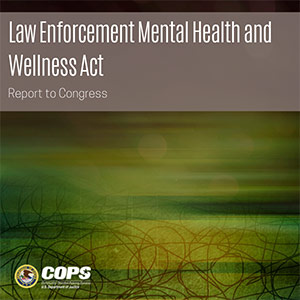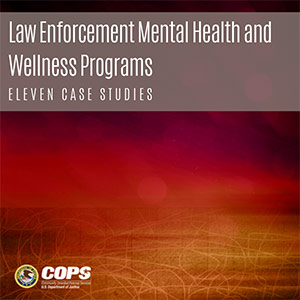Contact Us
To provide feedback on the Community Policing Dispatch, e-mail the editorial board at CPDispatch@usdoj.gov.
To obtain details on COPS Office programs, publications, and resources, contact the COPS Office Response Center at 800-421-6770 or AskCopsRC@usdoj.gov

U.S. Department of Justice
Office of Community Oriented Policing Services
Washington, DC 20530
Every day, the United States’ 800,000 police officers, deputies, troopers, and agents shoulder responsibility for keeping our communities safe, helping those in need, and running toward incidents that the average person runs from. For these reasons, a career in law enforcement has long been viewed by society as a noble pursuit. However, what is not commonly known by those who have never worn the badge or had a family member who has is that a career in law enforcement can come at an emotional cost to the men and women who pursue it.
 In support of efforts to reduce the emotional burden inherent to the profession, this month the U.S. Department of Justice (DOJ) released two complementary reports that focus on the mental health and safety of the nation’s federal, state, local and tribal police officers. The reports, Law Enforcement Mental Health and Wellness Act: Report to Congress and Law Enforcement Mental Health and Wellness Programs: Eleven Case Studies, were published by the Office of Community Oriented Policing Services (COPS Office) as required by the Law Enforcement Mental Health and Wellness Act (LEMHWA) of 2017.
In support of efforts to reduce the emotional burden inherent to the profession, this month the U.S. Department of Justice (DOJ) released two complementary reports that focus on the mental health and safety of the nation’s federal, state, local and tribal police officers. The reports, Law Enforcement Mental Health and Wellness Act: Report to Congress and Law Enforcement Mental Health and Wellness Programs: Eleven Case Studies, were published by the Office of Community Oriented Policing Services (COPS Office) as required by the Law Enforcement Mental Health and Wellness Act (LEMHWA) of 2017.
LEMHWA passed both chambers of Congress unanimously, without amendment, and was signed by the president shortly thereafter. These actions show that its purpose and intended effects are uncontroversial among policymakers—law enforcement agencies need and deserve support in their ongoing efforts to protect the mental health and well-being of their employees.
 "Serving as a law enforcement officer requires courage, strength, and dedication," Attorney General William P. Barr said. "The demands of this work, day in and day out, can take a toll on the health and well-being of our officers, but the Department of Justice is committed to doing our part to help. I want to thank the men and women of our COPS Office for their hard work to support our officers every day, and specifically for these thoughtful and insightful reports, which detail both the challenges facing our officers and some specific ways we can give them the support that they deserve."
"Serving as a law enforcement officer requires courage, strength, and dedication," Attorney General William P. Barr said. "The demands of this work, day in and day out, can take a toll on the health and well-being of our officers, but the Department of Justice is committed to doing our part to help. I want to thank the men and women of our COPS Office for their hard work to support our officers every day, and specifically for these thoughtful and insightful reports, which detail both the challenges facing our officers and some specific ways we can give them the support that they deserve."
"A damaging national narrative has emerged in which law enforcement officers—whether federal, state, local, or tribal—are seen not as protectors of communities but as oppressors," said COPS Office Director Phil Keith. “In this environment, where an inherently stressful job is made more so by a constant undercurrent of distrust and negative public opinion, the risks to officer wellness are exacerbated. This report is an important measure and reflection in our ongoing commitment to protect those who protect us."
Under LEMHWA, the DOJ was required to submit reports to Congress that addressed the following:
- Recommendations to Congress on effectiveness of crisis lines for law enforcement officers, efficacy of annual mental health checks for law enforcement officers, expansion of peer mentoring programs, and ensuring privacy considerations for these types of programs
- Mental health practices and services in the U.S. Departments of Defense (DoD) and Veterans Affairs (VA) that could be adopted by federal, state, local, or tribal law enforcement agencies
- Case studies of programs designed primarily to address officer psychological health and well-being
The first report, Law Enforcement Mental Health and Wellness Act: Report to Congress, includes 22 recommendations to Congress ranging from supporting programs to embed mental health professionals in law enforcement agencies to supporting the development of model policies and implementation guidance for law enforcement agencies to make substantial efforts to reduce suicide.
The case studies report, Law Enforcement Mental Health and Wellness Programs: Eleven Case Studies, is designed to provide an overview of multiple successful and promising law enforcement mental health and wellness strategies with the joint aims of informing Congress, state and local government officials, and the law enforcement field. The report includes 11 case studies from a diverse group of sites across the United States.
Subscribe to Email Updates
To sign up for monthly updates or to access your subscriber preferences, please enter your email address in the Subscribe box.






